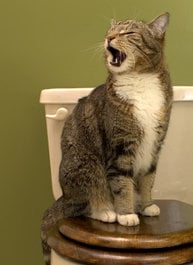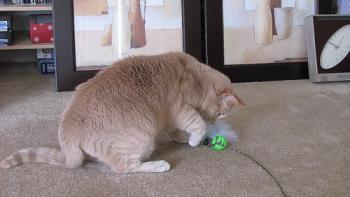Is your cat meowing all night? It really can get on your nerves, ruin your sleep, your wellbeing and even your relationship with your beloved pet. You aren’t alone as excessive loud meowing is a very common complaint from our patients who seek a professional cat behaviorist help. In most cases the solution to this behavioral issue is just around the corner.
In this article you are going to learn about possible causes of excessive meowing in cats, and most importantly, how to stop your cat from meowing all night.

Table of Contents
- Why do cats meow?
- Why is your cat meowing at night?
- Why does your cat meow in the middle of the night?
- How to stop a cat from meowing at night?
- How do you teach your cat to stay quiet: 6 steps
Why do cats meow?
Cats meow to communicate with people. Or rather, servants. Can you tell I just finished cleaning out all the litter boxes? The common reasons your cat meows is to say hello, ask for something, or to tell us something is wrong. Cats don’t meow at their feline friends, just us people. Your cat could be hungry, thirsty, lonely, or they don’t feel good. The latter could indicate a medical issue so it’s worthwhile to investigate.
Why is your cat meowing at night?
Cats are crepuscular animals. That means they are more active at night. It’s different than our body clock which has us active during the day. This is because your cats ancestors prey was active at night. This meant cats adapted to hunt their prey when they were most available. That’s why your cat bothers you at night. To you it’s your bedtime. To your cat, it’s party time. Before planning any solution to excessive meowing, you must first find out what is causing the problem. It’s normal for a cat to meow on many occasions. If the meowing happens too often, likely something is bothering your cat. Let’s find out what it could be. For many a cat owner, the exact reason may be obvious, while some may have no idea about why their cats meow so much.
Why does your cat meow in the middle of the night?

Most common causes of excessive moving in cats:
- Attention seeking. This covers a wide group of possible causes, but it’s also the most common. That reason is your cat wants attention. Having a meowing cat at night will definitely get your attention, but what could yours be looking for? There may be different forms of attention, like begging for food, petting, playing, thirst, stress, or simply for an acknowledgment of their presence.
- Pain and other medical causes. When you are in pain, it makes you want to cry right? Of course it does. Does it help when people say: “Don’t cry”? Of course it doesn’t. What you really want is for the pain to go away. That will make you smile. Before trying to cure your cat’s excessive meowing, it is wise to visit your veterinarian for a checkup. Please understand that cats usually try to mask their weaknesses. This is ingrained. In the wild, weakness is what turns the hunter into the hunted. This explains the cat behavior of hiding their pain or weaknesses. If your cat is meowing due to pain, it may be that your cat’s pain is very severe. We often see older cats howl at night. This is often due to kidney disease. That said, health issues that cause pain could be something simple like a burr stuck on their pad or something serious like an overactive thyroid, kidney disease, or other thyroid issues.
- Territorial Claiming. Cats can vocalize excessively if their territorial needs aren’t met. For example, one of our other cats were blocking our male cats access to a certain area. This was creating some form of stress for him. So he came over and meowed and meowed at us while we were trying to enjoy our morning coffee. His royal highness wanted us to clear the offender from his way. Silly to us, but it was important to him. Please note that cats of both genders may be territorial. It’s not only about other cats in your household. Your male cat can also have territorial issues with your kids, dogs, physical objects, and even outdoor cats that they see through the window.
- Hunger and thirst. It’s not the same as begging for food as mentioned above.Cats may constantly beg for food for various reasons, and hunger is just one of them. Here we mention that real actual hunger because your cat isn’t getting enough food. If your cat isn’t underweight and you are feeding the amount that is listed on package, you can rule this one out. Try scheduling regular feeding times and measure your cats food to ensure they are getting enough. If they are, but seem to be losing weight, take your cat to your veterinarian. We had one patient that used an automatic feeder while they were at work. Turns out their cat didn’t like the noise the feeder made and avoided it. They changed the feeder and voila, happy kitty. Please remember, if your cat isn’t drinking enough water, it’s not because they don’t want to, but there may be something wrong with the water, the bowl, or the location of the bowl. One of our cats refused to drink water because her whiskers touched the sides of the bowl. This took us a while to figure out by trying everything from drinking fountains to different shaped bowls. Using a wide bowl worked and it dawned on us what her problem was in the first place. Remember, fresh drinking water has to be accessible at all times.
- Sexual behavior.
- Do male cats meow when they want a partner? Yes, but no one comes anywhere near the female cat cries when she is in heat. In such case you don’t have many options. The number one way to resolve the excessive vocalization is to spay or neuter your cat. The number two option is to try to soothe your cat which will reduce, but won’t eliminate the meowing.
- Litter box issues. Your cat may be the type that will only go in a clean litter box. One of our patients said their cat would use the new litter box because the litter tray moved when her cat stepped on it. If your cat isn’t using their litter box, you may try to sift the dirty litter box at least twice a day. If that doesn’t solve it, try more often. If your litter box is near something that makes loud noises, like the washing machine, that could also be the source of their constant meowing.
- Neurological causes. xcessive meowing may also be for no reason and exhibited as a compulsive behavior. Cognitive decline in an elderly cat is something to investigate. In such cases a veterinary consultation is recommended.
How to stop your cat from meowing at night?

Now that we have identified the possible causes, we can work on different treatment options. Remember that you aren’t looking to stop your cat meowing completely. You are trying to solve the problem that is causing the night calling or meowing at inopportune times. Please understand that meowing is a natural behavior for cats. It’s important to understand that they don’t do it to communicate with other cats. Cats mostly use scents and body language to communicate with each other. Meowing in the vast majority of cases is directed towards us humans.
Meowing is a way your cat tells you something. All you have to do is to listen.
How do you teach your cat to stay quiet: 6 steps

IMPORTANT: The below steps are applicable for cats exhibiting attention seeking behaviors and may be useful to helping to reduce territorial and hunger related meowing. If you suspect your cat may be meowing due to pain or other medical causes, please consult with your veterinarian. For territorial cats, spaying and neutering usually go a long way towards reducing if not eliminating the problem.
- Remove the cause of excessive meowing if possible. That is, if your cat is territorial and aggressive towards other cats, make sure you do what you can to reduce the tension. As mentioned above,spaying or neutering your cat will be helpful. If you notice your cats are fighting over a perch or the top a cat tree, that is their way of telling you what to do. We found adding more cat trees, shelves, or perches. Giving your cats space to call their own often fixes this issue.
- Increase nutrition and reduce stress. your cat is underweight, which means they are underfed, start feeding an appropriate amount. If your cat is stressed from outdoor cats, try to block the outdoor view or deter foreign cats away from your yard. In many cases finding and removing the cause of excessive meowing will be enough to make it stop. However, if the meowing has also become a habit, the below steps may be necessary, as well.
- Ignore your cat’s meowing. What is the easiest way to stop a cat meowing? Giving them what they want. But it’s a very bad solution because your cat will soon repeat the behavior again. You unintentionally taught them that to get what they want, meow. We recommend that instead of rewarding the undesirable behavior, ignore your cat’s meows (unless they need something that is important). This is especially key when they are doing it at the door to your bedroom at night. Don’t even scold or discourage your cat because it’s still attention and giving your cat attention is what they are after. Completely ignoring meowing is the only way to stop it (of course, after you have checked that there is nothing wrong with your cat).
- Provide activity to your cat. Your cat is a natural born hunter and their energy levels are high. If this energy isn’t expelled, your cat can jump on things and people, destroy your living room or, if you are lucky, just meow all day. The fastest way to get your cat moving is to have two or three play sessions per day. Before you feed them, take a toy on a string, laser pointer, or a wick and let your cat chase it to release their hunter instinct. Let them stalk, follow, jump upon, and bite the toy. This more closely mimics hunting to your cat and is what releases the most of your four legged fur baby’s hunting energy. Let them recover a bit then serve them their meal. Scheduling these play and feeding sessions at the same time of day will teach your cat when to expect them. If you think you can go for more creative solution, we have a list of several more ways to provide an activity to your cat.
- Provide meals on a strict schedule. This is critical if your cat is begging for cat food all the time. You should (at least initially) provide meals with a strict time table. Set a reminder on your phone. It really helps. Try not to fluctuate meal times by more than 15 minutes either way. Your cat wants predictability. Give two to four small meals per day leaving the final meal just before you go to bed. Why? Because cats naturally tend to take a nap after a meal.
- Reinforce quiet behavior. If your cat’s meowing ceases but it’s not quite there, you can try to reward your cat’s good behavior when they are quiet. Since it’s very hard for your cat to understand the difference between meowing and being silent, clicker training may be useful. What you want to do is to give a reward every time your cat is quiet for about two minutes. This reward can be a treat, special food, or their regular food. In either case, make sure to subtract what you feed from your cat’s daily feeding amount.
The above 6 steps should give you a significant improvement in reducing or even eliminating excessive meowing of your cat. If it didn’t, please consider visiting your veterinarian for finding the true cause of your cat’s meowing. For solutions to other cat mis-behaviors check this page.
You have learned about possible causes of excessive meowing in cats, and most importantly, how to stop your cat from meowing all night. Now that you know how to stop cat from meowing all night, you’ll be able to get a better nights sleep. This will go a long way towards a peaceful and happy life with your pet cat. And keeping your Pet happy is what we all want.
FAQ
Question: Why do cats meow?
Answer: Cats meow to communicate with their human owners and express various needs or emotions, such as hunger, thirst, loneliness, or discomfort.
Question: Why is my cat meowing at night?
Answer: Excessive meowing at night could be caused by various factors, including attention-seeking behavior, pain or medical conditions, territorial claiming, hunger and thirst, sexual behavior, litter box issues, or neurological causes.
Question: How do I stop a cat from meowing at night?
Answer: To address excessive meowing at night, you can follow these steps: 1) Remove the cause of excessive meowing if possible, 2) Ensure proper nutrition and reduce stress, 3) Ignore your cat’s meowing unless it’s important, 4) Provide regular play sessions to release energy, 5) Schedule meals on a strict timetable, and 6) Reinforce quiet behavior through reward-based training.
Question: What should you do if these steps don’t stop my cat from meowing?
Answer: If the steps mentioned above don’t effectively reduce or eliminate your cat’s excessive meowing, talk to your veterinarian to identify the underlying cause of the behavior and explore further solutions.
